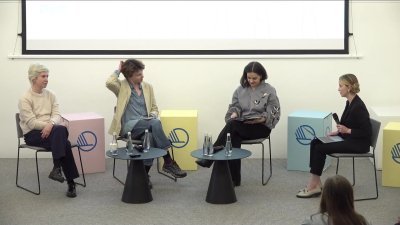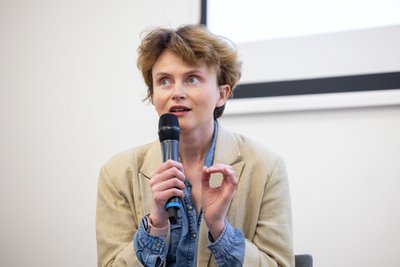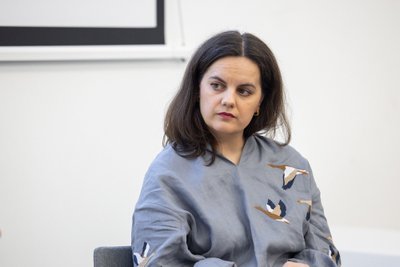According to the estimates of the UN, as of February 2024, there were almost 6.5 million Ukrainian refugees in the world. About 41,000 Ukrainian war refugees remain in Lithuania, which provides unprecedented assistance to Ukraine.
Lina Šlipavičiutė-Černiauskienė, the co-author of the book “Escaped from the Hell”, in which she collected the stories of the Ukrainian women, shared some knowledge about the main challenges for their heroines in rebuilding their lives from zero in Lithuania.
“It was really hard for them to live here, to be here. Not only because they left so many things behind in Ukraine: their homes, their jobs, their beloved people, but also because some of them knew that their husbands, sons or brothers were at war, they were worried about them every day. But here, they need to find a job, to get food for their children and many, many other things,” Lina explained.

She also added: “I know that some of them, many of them already came back to Ukraine. Despite that the war is still going on there. It's really scary for me because some of them are my friends now, and I know that they are in Ukraine, in frontline cities like Zaporizhzhya, and sometimes I get messages about bombing there…”
As the Ukrainian men went to defend the country from Russian occupiers, some women had to take on the additional burden of caring for their family and experienced so-called changes in gender roles.
Eugenija Kovaliova, Lithuanian CEO of the Ukreate Hub, who on a daily basis helps displaced Ukrainians, shared some examples of this problem.
“I don't want to generalize because I don't have sociological or anthropological data, but I do see the same trend: women who were housewives suddenly had to take over a family business and run it in a new country. It's a huge challenge and requires internal transformation. But the reality is that women have to be able to do that,” Eugenija pointed out.
The results of some research reflect the loss of professional identity among Ukrainian women because of displacement, which is “additional trauma for many women”, emphasized the panelist.
“Some women, who were head of a shopping mall in Ukraine, finds themselves here, and because, let's say, of a lack of language skills, they cannot work in the same position. A woman has to go and work in a shopping mall as a cashier. That affects her self-perception, also in terms of gender,” Eugenija said.

“And sometimes they really feel like men. I had conversations with some of them, not officially, but just over coffee, and some of them said to me that they must work and do everything that in the past was the role of a man,” Lina added.
When it comes to the Russian and Belarusian women, they meet other challenges. The third panelist Olga Johannesson from Denmark, who is originally from Russia, an author of the documentary project “Women in War,” spoke about the moral problems.
“How they remember their day of the Russian full-scale invasion into Ukraine? And how do they feel now? Interestingly, but not surprisingly, the answer is no different from the refugee women who fled from the war. The answer would be that the effect was just devastating and the crushing of identity. In a different way for women who flee from the war, it's also a crushing of identity, because they have to identify and find themselves who they are now, what they're supposed to do,” Olga said.

Eugenija, who also has Russian roots, shared her own experience.
“I clearly remember the day the war started, I clearly remember the day Putin made his speech a couple of days before the war, and it crushed my identity. I questioned, can I speak to my children in Russian? What do I do with it? Do I read Pushkin or do I throw his books away? And at the same time there was a huge guilt and I think this is a conversation we had with many Lithuanians with some Russian background. I cannot feel any of these things, I cannot bring them to the surface because this is incomparable to what Ukrainians have to go through right now,” Eugenija said, “I believe it does affect those who are conscious enough, but I cannot speak about anybody else, except for myself.”
Panelists also emphasized that there are sometimes speculations on international platforms about whether Ukrainians and Russians are ready for a dialogue now. Eugenija provided some examples to illustrate her opinion on this matter.
“You know, when a member of the Ukrainian community starts crying just by mentioning the name of her hometown, it's not the right time," Eugenija said. "I think it's so important to understand that nobody else but Ukrainians themselves should decide when they are ready for a dialogue, for that conversation.”
Olga supported the notion that there is no need to impose the idea of a dialogue at this sensitive time while the war is in full swing. She shared some examples too.
“It was the second year into the war when the public talk started to happen at the democracy festivals. Every Ukrainian, every Russian woman said that it's not the time for a dialogue. I personally believe that as well. This is not the time for understanding right now. This is not the time for a dialogue,” Olga observed.
She concluded that it's up to Ukrainians to decide “when they are ready to start this dialogue or ready to make a step towards some kind of understanding”. Olga added that a lot would have to be done for this possible dialogue to happen.
This publication has been produced with the financial support from the Nordic Council of Ministers. The content of this publication is the sole responsibility of the coordinators of this project and do not necessarily reflect the views or the policies of the Nordic Council of Ministers.

